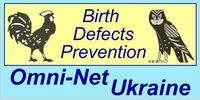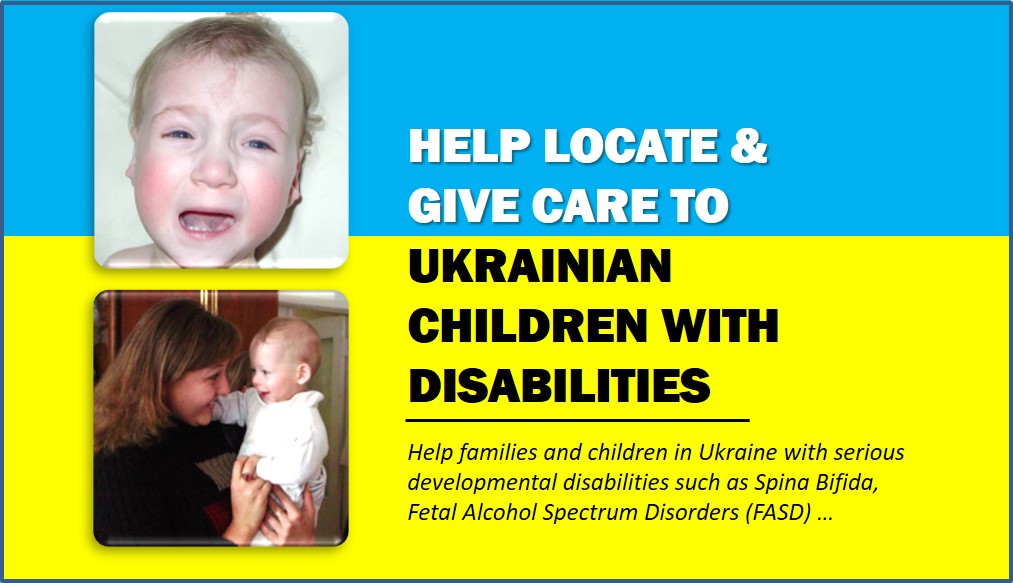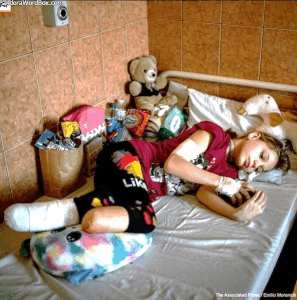On September 17, 2018, a scientific-practical conference with international participation entitled “Interdisciplinary Support of Children at Risk: International Experience” began in the assembly hall of the Volyn Regional Children’s Territorial Medical Center (Lutsk, Ukraine). The organizers of the conference were: “OMNI-Net for Children” International Charitable Fund (OMNI-Net), Health Care Department of the Volyn Regional State Administration, L. Ukrainka Eastern European National University (EUNU) and Education Department of the Lutsk City Council. The purpose of the conference was to disseminate knowledge about congenital malformations and their prevention, early detection and neurobehavioral aspects of Fetal Alcohol Syndrome (FAS), impact of environmental factors on pregnancy and children’s health.
Participants of the first day of the conference
Participants of the conference listened to the reports of prominent scientists in the field of Pediatrics, Teratology, Medical Genetics, Psychology from the USA: Wladimir Wertelecki, MD (Director of Child Development and Birth Defects Prevention Programs and Head of the Board, OMNI-Net Ukraine; a foreign member of the National Academy of Sciences of Ukraine), Christina Chambers, MD (Professor, Division of Dysmorphology and Teratology, Department of Pediatrics, University of California, San Diego, USA), Kenneth L. Jones, MD (Professor of Pediatrics, Head of the Division of Dysmorphology and Teratology, Department of Pediatrics, University of California, San Diego, USA), Claire D. Coles, PhD (Department of Psychiatry and Behavioral Sciences, School of Medicine, Emory University School of Medicine, Atlanta, GA, USA). Julie A. Kable, PhD (Department of Psychiatry and Behavioral Sciences, School of Medicine, Emory University School of Medicine, Atlanta, GA, USA) presented “MILE” and “GoFAR” correction programs, developed by a team of authors (she is one of them) and designed to support educational needs of children with FAS.
More than 80 participants attended the first day of the conference, among which were neonatologists, pediatricians, medical geneticists, pediatric neurologists and psychiatrists, obstetricians, gynecologists, family doctors, psychologists, and interns. OMNI-Net provided pediatricians of all counties of the province with 20 copies of the “Understanding the FASD and Advocating for Children: A Guide for Caregivers” intended for parents, caregivers, teachers, psychologists and physicians.
The second day of the conference was held on September 18. It was in the form of two parallel sessions: one at the L. Ukrainka Eastern European National University and another in Lutsk Comprehensive School № 20.
Session A under the title “Scientific Perspectives” was held in the EUNU library with the participation of US scientists and university faculty members, led by Vice-Rector for Science and Innovations Andriy Boiar. Among the representatives of the university departments were: Andriy Poruchinsky (Dean, Department of Biology), Anatoliy Fedoniuk (Head, Department of Higher Mathematics and Informatics), Alevtyna Morenko (Head, Department of Human and Animal Physiology), Yaroslav Goshovsky (Head, Department of Pedagogical and Age Psychology), Tetiana Kachynska (Associate Professor, Department of Human and Animal Physiology), Olha Abramchuk (Associate Professor, Department of Human and Animal Physiology), Tetiana Mamchych (Associate Professor, Department of Higher Mathematics and Informatics), Larysa Chyzhevska (Associate Professor, Department of Physical Geography), Illya Kuznetsov (Associate Professor, Department of Human and Animal Physiology), and Iryna Svitnytska (Laboratory Assistant, Department of Higher Mathematics and Informatics).
Julia Cable was the first to report “The Use of Functional Near-Infrared Spectroscopy (fNIRS) in Studying Individuals with FASD”. Christina Chambers spoke about an international collaborative research initiative on the study of Fetal Alcohol Spectrum Disorders (CIFASD). Wladimir Wertelecki familiarized the audience with the results and prospects of OMNI-Net activities. In turn, representatives of the university departments told about the main directions of scientific research, which are conducted in the EUNU. At the end of the speeches, there was a lively discussion about possible ways of scientific collaboration.
J. Kable, PhD (left photo) and K. Chambers, MD
Reports of the EUNU representatives
Session B entitled “The Impact of Alcohol on Education – International Experience” was held at Lutsk Comprehensive School No.20. More than 120 participants from different Lutsk institutions involved in the upbringing and education of children participated in the session, in particular: school psychologists (16 persons), social workers (17), teachers of junior classes implementing inclusive education (25), teacher assistants (4), speech therapists and educators of the children’s home. There were also 4 representatives of the Regional Center for Social Services for Children, Family and Youth, employees of the City Education Department headed by Zinoviya Leshchenko (Head of the Department), as well as professors and students of the EUNU Department of Psychology.
Since the audience was mainly presented by educators and school psychologists, the most attention was attracted by materials focused on the prenatal effects of alcohol on development, intelligence and learning disabilities of children (Clare Cole’s report). According to the feedback from many participants, they heard this information for the first time and a special impression was made by the results of serious scientific research conducted in Ukraine with the participation of scientists from leading universities of the world. Despite the fact that there were no medical specialists, the audience was very interested in the information about diagnosis of FAS, in particular about a specific set of facial dysmorphias and disorders of the central nervous system development. In conversations during the break, some listeners noticed that in their practice they encountered children with similar sets of deviations and the information they heard would allow them to find the correct pedagogical approach. The participants of the conference got acquainted with the use of the MILE program for interactive learning of Mathematics in working with children with special educational needs, as well as with the GoFAR development program (report by Julie Kable). According to the feedback of the participants of the conference, the received knowledge is of great practical value and there is an urgent need to disseminate this information both among the teachers of schools and kindergartens and among the parents educating children with developmental problems.
At registration, the participants of the conference were invited to anonymously fill in the “Feedback Page”, evaluating the following using the 5-point system: organization of the conference, the novelty of the information presented and the possibility of practical use of the knowledge gained during the conference. It was also suggested to express ideas and wishes regarding the dissemination of the knowledge gained. In total, 120 filled sheets were received, in 100 (83%) of them there were given the highest marks on all questions. It should also be noted that no position in the sheets was rated below 4 points.
Regarding the proposals and ideas for disseminating the information received, the vast majority of participants proposed to conduct a broad educational campaign both through the mass media and by covering the issue during advanced education of teachers, at educational hours and parental meetings at schools.
Communications after the conference



















